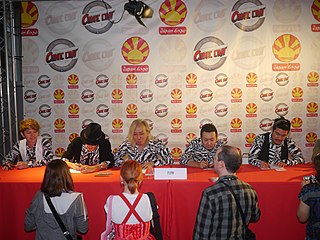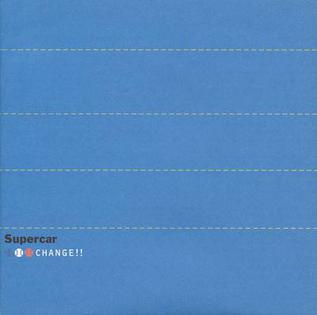
In Japan, music includes a wide array of distinct genres, both traditional and modern. The word for "music" in Japanese is 音楽 (ongaku), combining the kanji 音 on (sound) with the kanji 楽 gaku. Japan is the world's largest market for music on physical media and the second-largest overall music market, with a retail value of US$2.7 billion in 2017.

Eureka Seven, known in Japan as Psalms of Planets Eureka Seven, is a 2005 Japanese anime series created by Bones. The series was directed by Tomoki Kyoda, with series composition by Dai Satō, character designs by Kenichi Yoshida and music by Naoki Satō. Eureka Seven tells the story of Renton Thurston and the outlaw group Gekkostate, his relationship with the enigmatic mecha pilot Eureka, and the mystery of the Coralians. The fifty-episode series aired on MBS between April 2005 and April 2006. It was licensed by Funimation in North America, Madman Entertainment in Australia and New Zealand and by Anime Limited in the United Kingdom for English home video releases.

Quruli is a Japanese rock band formed in Kyoto in 1996. It has been a duo consisting of original members Shigeru Kishida and Masashi Sato since March 2021. They have been signed to Speedstar Records since 1998. In 2003, Quruli were ranked number 74 on a list of the top 100 Japanese pop acts by HMV Japan.
Naoki Satō is a Japanese composer. He has provided the music for several popular anime series and films, including the first five Pretty Cure series, X, Eureka Seven, Sword of the Stranger, and Blood-C.
Supercar was a Japanese rock band active from 1995 to 2005, who made their debut in 1997. Consisting of composer and vocalist Kōji Nakamura, lyricist and guitarist Junji Ishiwatari, bassist Miki Furukawa, and drummer Kōdai Tazawa, Supercar is best known for combining alternative rock with electronic music and has been characterized as having an "almost foundational importance to 21st century Japanese indie rock". Internationally, Supercar is also known for providing much of the soundtrack for the Japanese film Ping Pong, as well as being featured in the anime series Eureka Seven.

JAM Project are a Japanese anison band founded on July 19, 2000, by anison singer Ichirou Mizuki. The band is composed of many vocal artists well known in the anime music industry. Aside from the many anime, tokusatsu, and video game theme songs the band has performed together, each member is famous for their own solo performances of Japanese theme songs. JAM Project is known to worldwide audiences for their theme music contributions to Garo and One-Punch Man.

Flow is a Japanese rock band formed in 1998 as a five-piece band made up of two vocalists, a guitarist, a bassist, and a drummer. They are signed to Sacra Music. As of November 2023, the band has released 40 singles and 12 studio albums. Their songs have been featured in the opening sequences of several anime and Japanese drama series.

Dai Satō is a Japanese screenwriter and musician.
Koji Nakamura is a Japanese musician who is most famous for being the lead singer/songwriter in the Japanese band Supercar. His music style in general involves drone-like guitar riffs and mixed in raw electronica. He presently records music under the names iLL and Nakamura Koji, and also participates in a band called Lama.
The discography of Japanese rock band Abingdon Boys School includes two studio albums, eight singles, one live album, four video albums, one compilation album, eight soundtrack appearances, and seven other appearances in releases not under that name. Abingdon Boys School, was formed in 2005 by Takanori Nishikawa, or T.M.Revolution, who originally named the band ABS after Ebisu, Tokyo, Japan, and later changed the band's name to Abingdon Boys School, a school formerly attended by members of Radiohead. The band plays alternative rock and is currently signed to Epic Records Japan.
Miki Furukawa is a Japanese musician. From 1995 to 2005 she was the bass player and vocalist of the indie rock band Supercar. She released her first solo record in 2006.
Junji Ishiwatari is a Japanese musician, songwriter and record producer. He is also famous for being a guitarist of the Japanese band Supercar.

Three Out Change is the debut studio album by Supercar. Released on April 1, 1998, it peaked at number 20 on the Oricon Albums Chart. The album helped establish Supercar as an important and influential Japanese rock band. Music critic Ian Martin has described it as an "epic indie rock/shoegaze album" and "one of the all-time great Japanese rock albums."

Futurama is the third album by the Japanese indie rock band Supercar. The album's name is a portmanteau of the words "future" and "panorama." Musically, its electronic experimentation marked a significant shift for a group whose music two years earlier had been characterized primarily as guitar rock.

Answer is the fifth and final non-compilation album by the Japanese indie rock band Supercar. It was released on February 25, 2004 and peaked at #18 on the Oricon Albums Chart.
Japanese rock, sometimes abbreviated to J-rock, is rock music from Japan. Influenced by American and British rock of the 1960s, the first rock bands in Japan performed what is called group sounds, with lyrics almost exclusively in English. Folk rock band Happy End in the early 1970s are credited as the first to sing rock music in the Japanese language. Punk rock bands Boøwy and The Blue Hearts and hard rock/heavy metal groups X Japan and B'z led Japanese rock in the late 1980s and early 1990s by achieving major mainstream success.
Kensuke Ushio is a Japanese composer, rock and EBM musician. He also releases work under the moniker Agraph.
428: Shibuya Scramble is a visual novel video game developed by Chunsoft and published by Sega. The game was released in 2008, and spawned the sequel anime series Canaan, created by Type-Moon and animated by P.A. Works and aired in 2009. The music of 428: Shibuya Scramble and Canaan spans two soundtrack albums, four singles, and one character song album.









